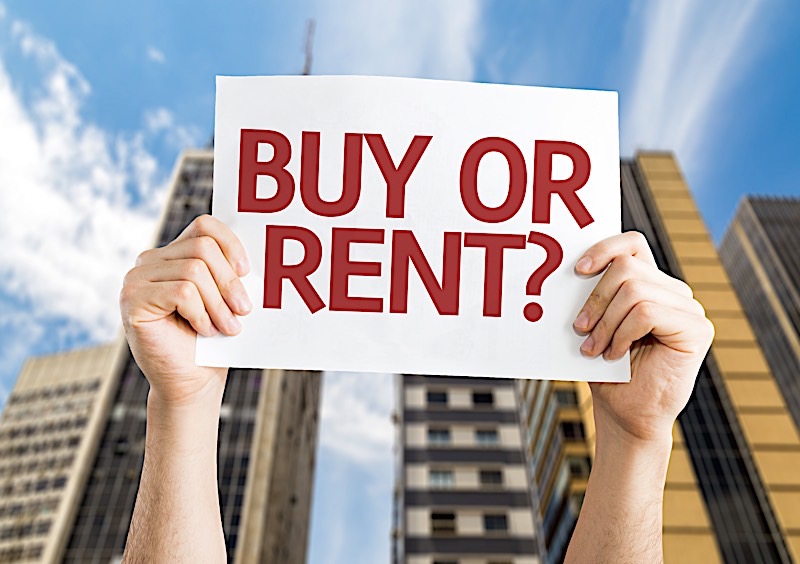Rent Vs Buy: The Facts To Help You Form Your Own Opinion
By Than Merrill
Should I rent or buy? A simple question, but nonetheless one that nearly everyone will ponder at one point or another. The rent vs buy debate wouldn’t be much of a debate if the question wasn’t so divisive, right? The only real way to develop your own objective opinion, for that matter, is to listen to the facts as they present themselves in the form of real world data. The real answer to the rent vs buy question is entirely dependent on each person’s unique situation.
Before you jump to any conclusions, be sure to take everything you are about to read into consideration. With any luck, your own rent vs buy debate will correspond with a definitive answer by the time you are done reading this.
Rent Vs Buy Analysis From A Pro
The rent vs buy debate rages on to this day, and for good reason: each side has made some compelling arguments of their own that, at the very least, warrant your consideration. Owners, for example, will quickly point out the single greatest benefit of ownership: equity. Those that actually make purchases of their own build equity in a property with each and every payment made. That way, when it comes time to sell, there are profits to be made. It is worth noting, however, that the same equity argument posed by owners comes with a caveat: you must be willing to live in a property long enough for it to build equity, and even then, equity isn’t guaranteed. Proponents of renting are, therefore, quick to point out the disadvantage of living in the same home for a prolonged period of time. What’s more, there are some renters that think paying down a mortgage is a fool’s errand, in that a large percentage of owners never actually finish paying off their mortgage.
To be perfectly clear, there are obvious advantages to each, and drawbacks, for that matter. As I already alluded to, homeownership awards owners the ability to build an equitable share in a valuable asset. In fact, equity is both an asset and considered to contribute to one’s own net worth. That said, equity isn’t a liquid asset. According to Investopedia, “it cannot quickly be converted into cash.” Moreover, “value fluctuates over time as payments are made on the mortgage and market forces play on the current value of that property.”
I am a huge proponent of homeownership, but that doesn’t mean it’s for everyone. Of course, there’s the cost. While equity is great, it comes at a price. Homeownership isn’t cheap and usually requires a large down payment; one a lot of people can’t afford earlier in their lives. That, and the commitment that follows. Homeownership isn’t the result of a fleeting feeling; it’s a conscious decision to settle down and stay in the same place for what will most likely be a prolonged period of time. And while the idea of living in the same place suits a lot of people, there is a large contingent that hates the idea of being stuck in the same place for too long.
Many of the same renters that covet the idea of being able to move at the end of a lease are strongly in favor of the price of renting. Renting, for example, doesn’t coincide with the same downpayment as buying. Therefore, renting is more “accessible” to more people.
In the end, the rent vs buy debate can only be settled once you take into account each person’s personal situation. Sometimes buying makes more sense for people, and sometimes renting makes more sense. It may not be the answer you wanted to hear, but it’s nonetheless an answer. The fact remains: whether or not you will benefit from buying or renting will depend entirely on your own situation.
[ What’s the best investment strategy for YOU? Take “The 10-Minute Real Estate Investor Personality Test” and find out ]

Rent Vs Buy Calculator
There’s no simple answer to this simple question. As NerdWallet points out, “This is a decision with many moving parts, and things change: Your down payment savings grow, you consider moving to a cheaper or more expensive area, you’re curious what happens if you spend less on a home, or more.”
As it turns out, those “moving parts” are as follows:
- Where you decide to call home
- The Home’s purchase price
- The down payment
- The terms and duration of the loan
- The length of time you live in the home
- Comparable costs of renting a similar home
Using these indicators, you can roughly estimate which decision is right for your situation, but if you would rather plug the numbers into a rent vs buy calculator, NerdWallet has something you might be interested in.
Renting A Home Pros
- Maintenance Is Covered (Usually)
- Lower Barrier To Entry
- Variable Lease Options
- Lower Cost Of Entry
Again, there is a large contingent of people that are convinced renting is better than buying. The reasons many of them use to support their claim are primarily founded in the four bullet points above, and for good reason: there’s no doubt they represent poignant issues in favor of renting. For starters, the barrier to entry is considerably lower than homeownership. Whereas those looking to buy will need to put down 20% in order to avoid paying private mortgage insurance (PMI), most renters will only need a security deposit and maybe the first months rent in advance. A 20% down payment on a $300,000 home will set buyers back $60,000 right off the bat. There’s no question about it: it’s a lot more affordable to start renting than buying a home. Of course, those numbers start to change once you have been renting for a prolonged period of time, but we’ll get into that later.
More importantly, it’s not just the money that redirects most people away from homeownership towards renting, but the underwriting as well. You see, owning a home coincides with receiving loan approval — not something everyone can get. There are a lot of underwriting regulations that must be addressed in order to even qualify for a mortgage. With that in mind, there’s a lot of people that not only don’t want to own, but also that can’t own. Renting is literally the only option they can choose.
In addition to the initial cost, most rental proponents will be quick to point out the benefits of variable lease options. Renters are typically allowed to choose how long they intend to rent for, granting a degree of flexibility made unavailable to homeowners. Renters are, therefore, not locked into 15- or 30-year mortgages like their owner counterparts. As a result, most renters have the freedom to pick up and move more frequently. You would be surprised at how high renters value their freedom to switch homes at the end of a lease.
Renting A Home Cons
- No Equity Potential
- Fluctuating Rents
- Lease Deadlines
- Limited Personalization
There are two sides to every coin, and renting a home is no exception. That said, there are plenty of drawbacks that coincide with renting. Namely, the largest qualm most owners have with renting is the inability to build equity in a home you are simply renting. As a renter, your monthly rent checks are given directly to the respective owner. As a result, the person that owns the home is making money off of the renter’s payments, whereas the renter is simply trading money for a place to live — their money isn’t doing anything for them beyond that. Homeowners, on the other hand, build equity with each payment — renters will never see their cash again.
What’s more, the amount renters are expected to pay can fluctuate from lease to lease. It is within the rights of landlords to raise rents, as long as they aren’t in a rent controlled zone. That means it’s entirely possible for rent to be increased at the end every lease. Leases can vary significantly in length; they can last from a single month to several years. Those with shorter leases, therefore, run the risk of their rents increasing more frequently.
Finally, those inclined to rent limit the amount they can personalize their living space. Most lease agreements will prevent tenants from making changes to the property, even if it’s something as simple as painting a wall. If you are someone that appreciates a more personal touch, renting may not be the best option.
Buying A Home Pros
- Tax Benefits
- The Chance To Build Equity
- Personalization
- The Ability To Add Value
Of all the potential options awarded to those looking for a place to live, I maintain that homeownership is the best way to go. There’s one simple reason I covet homeownership more than renting: equity. As I already alluded to, renters can’t build equity in a property; their money is traded for a place to live. However, the money homeowners pay towards their mortgage builds an equitable interest in a tangible asset. In other words, equity is both an asset and considered to contribute to one’s own net worth. The more an owner is able to pay down their mortgage, the more equity they can build. Once the principal is paid off, along with the interest, a homeowner will own the home free and clear. That means they will be able to live in the home without making payments to their mortgage provider. Of course, there are other costs, like maintenance and property taxes, but the mortgage is no longer detracting from their ability to save. In addition to that, the homeowner now has a valuable asset in their corner.
If that wasn’t enough, the tax benefits that coincide with homeownership are equally as impressive. Most notably, homeowners are able to deduct the amount they pay in mortgage interest each year from their taxable income — that’s no small amount of change. Considering interest rates for the average 30-year fixed-rate mortgage are somewhere in the neighborhood of 4.5%, the interest one could expect to pay on a home could be significant. The tax deductions alone could trump the cost of renting for some.
It is worth pointing out, however, that while the upfront cost of homeownership is a lot higher than renting, the scale starts to tip in favor of buying eventually. If for nothing else, there is usually a point when buying actually becomes cheaper than renting in the long run.
Buying A Home Cons
- Maintenance Costs
- Equity Isn’t Guaranteed
- Mortgage Underwriting Criteria
- High Cost Of Entry
While I am in favor of owning a home, buying a property is not without significant caveats; namely, the barrier to entry. First and foremost, buying a home is not cheap. There’s a good chance buying a house is the single most expensive cost most people will encounter over the course of their entire lives. The down payment alone can be enough to keep people from transitioning to homeownership, and that doesn’t even include the rest of the purchase price or interest on the loan. Put simply, owning a home has become synonymous with a much more expensive upfront cost. Again, owning can turn out to be cheaper in the long-run, but certainly not at the time of purchase.
If the upfront cost wasn’t enough, there are also rules and regulations one must abide by to make the dream of homeownership a reality. Unfortunately, however, there are those that don’t qualify for a loan. Whether it’s a low credit score or a lack of available funds, there are several obstacles standing in the way of many prospective buyers that have no other choice but to rent.

The rent vs buy debate continues to rage on, and for good reason: both sides have valid arguments. Truth be told, however, there is no universal answer. Whether or not you should rent vs buy is completely dependent on your own situation and what you want out of a property. It is worth noting, however, that owning a home has come synonymous with significant benefits, not the least of which renting could hold a candle to. Homeowners are awarded the opportunity to build equity and reduce their taxable obligations. Perhaps even more importantly, homeownership could eventually become cheaper than renting in the long term. Long story short: buying a home is worth it for those that can afford to do so, but not everyone can take the leap.
Key Takeaways
- Should I rent or buy? A simple question, but nonetheless one that nearly everyone will ponder at one point or another.
- A good rent vs buy calculator will help you decide whether or not you should, well, rent or buy.
- Perform a conclusive rent vs buy analysis to determine which path is right for you at the moment.